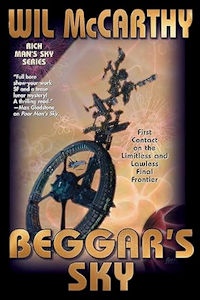Paul Di Filippo Reviews Beggar’s Sky by Wil McCarthy
 Beggar’s Sky, Wil McCarthy (Baen 978-1982193188, hardcover, 320pp, $28.00) February 2024
Beggar’s Sky, Wil McCarthy (Baen 978-1982193188, hardcover, 320pp, $28.00) February 2024
Wil McCarthy has had an atypical career that is almost neatly bifurcated. He came out of the gate strong with a duology, Aggressor Six, from 1994-1996. With the dawn of a new century, he delivered an even better, more mature and inventive series, Queendom of Sol (2000-2005). But then, for whatever reason, he fell more or less silent. There was a 2019 novel, Antediluvian, which flew so far under the radar that I was not even aware of it until I began the research for this essay. So when he commenced his current project, the Rich Man’s Sky series with its first book of the same title in 2021, there had been, effectively, a sixteen-year gap in his production. A similar arc occurred in the career of Tom Purdom. These things happen. But, like Purdom, McCarthy has obviously benefited from the layover, surging back with his chops honed, his zest high, his ambitions grand, his tone utterly au courant, and his palpable enjoyment in his work totally manifest.
The Rich Man’s Sky saga—not yet finished, I think, with book three; textual threads remain dangling, and we can anticipate Thief’s Sky—is a wildly entertaining, bravura performance, heartening in its display of old-school paradigms and conceits utterly retooled for the 21st-century audience. It’s proof that the methods and attitudes developed in the science fiction of the Golden and Silver Ages still possess vitality and relevance, and can provide immense enjoyment. This is state-of-the-art near-future SF.
The first book puts us in the year 2051, and instantly sets the stage. (Being not quite thirty years into the future, the scenario that we get seems pretty plausible to me—but only if humanity manages not to destroy itself with current geopolitical madness.) Lunar and near-Earth and Lagrangian space has been thoroughly exploited, with consequent changes to the global economy, politics, and climate-change trends. And it’s all down to the Four Horsemen. These are four trillionaires who all got bees in their bonnets to commercialize space. They are Igbal Renz, who’s building a giant solar shade out at one of the Lagrange points; Dan Beseman, who’s focused on colonizing Mars; Grigory Orlov, who commands vast resources of expensive, in-demand volatiles; and Lawrence Killian, whose Lunar bases include, besides mining plants, a monastery and a retirement home! These four men—their 2024 counterparts (Elon Musk, Richard Branson, Jeff Bezos, Bill Gates, Larry Page, Sergey Brin, Mark Zuckerberg, Yevgeny Prigozhin et al) all contribute elements of their biographies and characters to their fictional avatars—are the pivots that the saga will center on. But the supporting cast often steals the show—and in fact, McCarthy chooses to tell most of the plot from their POVs.
The first book introduces Alice Kyeong, an ultra-competent soldier, medic, and spy. She’s been recruited by the President of the USA to infiltrate Renz’s ESL1 Shade Station and disable him as a threat to the status quo. Her cloak and dagger adventures leave her in a place she never expected: functioning as Renz’s second-in-command. Meanwhile, another spy gal, Dona Obata, ends up on Orlov’s Clementine Cislunar Fuel Depot. Her cover blown, she faces death from the mercurial and irascible Orlov—until she too proves her worth. We also get less frequent glimpses into the affairs of the other two Horsemen, and we also meet the charming Brother Michael Jablonksi, head of the moon monastery.
This first installment functions as a kind of thrilling James Bondian adventure, complete in itself. The prose and dialogue are zippy without being sloppy, acing the Heinleinian goalposts. The science is convincing and clearly delivered. And the tone is optimistic without being naïve. The book also sets up lots of springboards for future installments: mainly, the possible existence of real aliens, sensed by Renz during his many hallucinogenic trips on DMT. (These coincide with the famous “machine elves” seen by Terence McKenna [1946-2000].)
The second book, Poor Man’s Sky, is almost a standalone, a stellar example of the SF-mystery hybrid genre. Set a year later in the future history, it takes place predominantly at the lunar monastery. Candidates for Beseman’s Mars mission are training there, and one is murdered. Cue the arrival of Raimy Vaught, Terran cop, who faces both human hostility and a precarious physical environment as he tries to solve the murder. We also see a labor rebellion at Orlov’s facility that forces him to modify his own oligarchic business strategies. Vaught is a wonderful character, the mystery is deep, and the suspense and danger run high. My only quibble is the non-appearance of Alice Kyeong, but that’s remedied soon.
Finally we come to the brand new Beggar’s Sky, which boasts a time jump of seven years, into 2059. A lot has changed. Alice is now fully in charge of the Shade Station, because Renz and a small crew and a hundred passengers (including Brother Michael from the Lunar monastery) have embarked on a novel “flutter-drive”-equipped space-ship to the edge of the solar system, where they hope to meet the DMT-sensed Beings in the flesh, so to speak. First Contact via hallucinogenics that will pierce the dimensions. Orlov and Dona are raking in the wealth until the arrival of Orlov’s teenage Eurotrash daughter, Sally, who brings a host of major troubles in her wake. Beseman’s colony on Mars is in its growing pains. And Lawrence Killian—perhaps the one Horseman with the least stage time till now—steps into the spotlight as he decides to retire. The depiction of his ruefulness adds a note of humility to all the grandstanding. (This thread also happily resurfaces Vaught.)
Not content with following all the arcs he’s carefully laid down in the first two books, McCarthy adds in two new diversions. There are now mysterious stealth spaceships shadowing all the doings of the Horsemen. Aliens? Other rival humans? Alice and company try to engage one, with bad results. This mystery will certainly get more play in a future volume.
The other addition is more fun, albeit perhaps less consequential. A “Fifth Horseman,” a guy named Tohias Nunez-Talamantes, has figured out how to colonize Venus: a singular floating island in the human-congenial stratosphere. On this island lives Frédéric Ortega, a teen who misses his former life on Earth. Like a charming Cory Doctorow character, Frédéric soon learns how to maximize the interplanetary web and social media for his own rewards and the furtherance of the Venusian settlement. There’s a nice strain of lightness and humor here.
All the threads reach satisfying stopping points, but their vectors point outward, for at least one more book.
McCarthy’s generosity (a character index supplement lists dozens more significant persons than I’ve cited) is seen everywhere here, but perhaps nowhere more tangibly than in the First Contact riffs. He gives us chapters from a dozen POVs of the human DMT scouts, and each person reports the aliens in a different manner, based on their own Weltanschauungs. This includes describing them with mathematical set notation, economic axioms, and musical scores! The story would have been exciting enough without this lagniappe, but getting these extra layers makes it very rich indeed.
In some previous reviews I tried to adumbrate a school of SF that would include the works of John Barnes, William Barton, James Cambias, and a few others. A muscular, upbeat, hip-without-striving-to-be-the-cool-kids way of portraying the future that sprang from the loins of Poul Anderson, Larry Niven, and John Campbell, among others, yet which was free of old shibboleths, having rethought all the assumptions of the ancestors. We can certainly add McCarthy to this nascent mode, and revel in his resurrection from that long interregnum.
 While you are here, please take a moment to support Locus with a one-time or recurring donation. We rely on reader donations to keep the magazine and site going, and would like to keep the site paywall free, but WE NEED YOUR FINANCIAL SUPPORT to continue quality coverage of the science fiction and fantasy field.
While you are here, please take a moment to support Locus with a one-time or recurring donation. We rely on reader donations to keep the magazine and site going, and would like to keep the site paywall free, but WE NEED YOUR FINANCIAL SUPPORT to continue quality coverage of the science fiction and fantasy field.
©Locus Magazine. Copyrighted material may not be republished without permission of LSFF.






